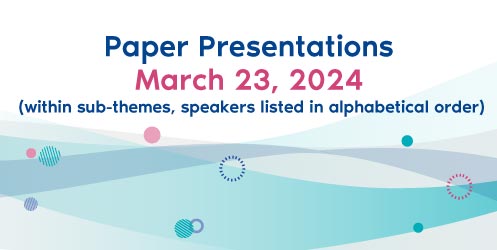Sub-theme 1: EAP/ESP course design and instruction

Heng-Tsung Danny Huang
黃恆綜

Li-Sheng Steve Lee
李立聖

I-Hsin Joy Luo
羅以欣

Eric Yen-liang Lin 林彥良

Carole MacDiarmid
(Presenting remotely)

Virginia Shiang-lan Shen
李香蘭

Rachel Jui-hua Chen
陳瑞華
Sub-theme 2: Planning & implementing EMI/CLIL

Hintat Cheung 張顯達

Tom Spain

Simon Dunton

Wen-hsien Yang 楊文賢
Analysing Learners’ Self-regulated Learning Strategies at Taiwan’s Tertiary Level
Sub-theme 3: Learning-oriented assessment in EAP/ESP education

Keita Nakamura
(Presentation canceled due to unforeseen circumstances)

Fumiyo Nakatsuhara

Richard Spiby

Emma Bruce

Shwu-Wen Lin
林淑雯

Jessica R. W. Wu
吳若蕙

Anita Chunwen Lin
林君文

Joyce Shao Chin
金韶

Xun Yan
Sub-theme 4: Alignment of college English programs to international standards

Jason Fan

Ivy Chen

Ute Knoch
(Presenting remotely)

Antonia Hsiu-chen Lin
林秀珍

Tina Hung-yu Chen
陳虹育
Sub-theme 5: Technology-enhanced English education

Mariano Felice

Hui-Chin Yeh 葉惠菁

Elayna Ah Puck
歐伊蘭
Foundation for Scholarly Exchange

Sarah Thomas
Foundation for Scholarly Exchange

Carolyn Ho
何瓊瑤

Shu-chen Ou
歐淑珍

Tong-yu Hsieh
謝東佑

Yu-Ting Kao
高郁婷

Yi-Ping Huang
黃怡萍

Lu-Chun Lin
林律君

Shin-Mei Kao
高實玫

Tzu-Bin Lin 林子斌

